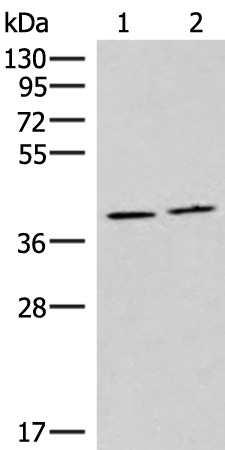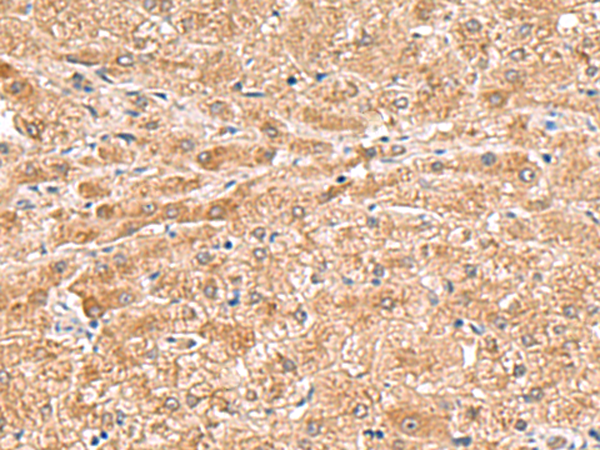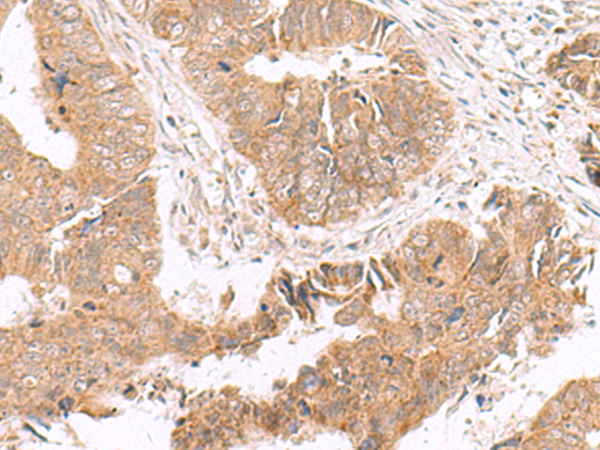


| WB | 咨询技术 | Human,Mouse,Rat |
| IF | 咨询技术 | Human,Mouse,Rat |
| IHC | 1/50-1/300 | Human,Mouse,Rat |
| ICC | 技术咨询 | Human,Mouse,Rat |
| FCM | 咨询技术 | Human,Mouse,Rat |
| Elisa | 1/5000-1/10000 | Human,Mouse,Rat |
| Aliases | er-cHL; bA418P12.1 |
| WB Predicted band size | 40 kDa |
| Host/Isotype | Rabbit IgG |
| Antibody Type | Primary antibody |
| Storage | Store at 4°C short term. Aliquot and store at -20°C long term. Avoid freeze/thaw cycles. |
| Species Reactivity | Human, Mouse, Rat |
| Immunogen | Fusion protein of human HMGCLL1 |
| Formulation | Purified antibody in PBS with 0.05% sodium azide and 50% glycerol. |
+ +
以下是与HMGCLL1(或可能相关基因)抗体相关的参考文献(若名称存在拼写差异,建议进一步确认目标基因):
1. **"Characterization of HMGCL antibody for detecting mitochondrial enzyme deficiency"**
*作者:Zhang Y et al.*
摘要:研究开发了一种特异性识别HMGCL(3-羟基-3-甲基戊二酰辅酶A裂解酶)的抗体,用于诊断线粒体代谢疾病,验证了其在患者组织样本中的表达缺失与酶活性降低的相关性。
2. **"A novel monoclonal antibody targeting HMG-CoA lyase in hepatocellular carcinoma"**
*作者:Li X et al.*
摘要:报道了一种靶向HMGCL的单克隆抗体,发现其在肝癌细胞中高表达,并探索了其作为治疗靶点或诊断标志物的潜力。
3. **"Antibody-based profiling of HMGCL isoforms in neurodegenerative disorders"**
*作者:Smith J et al.*
摘要:利用多种抗体分析HMGCL的不同剪接变体在阿尔茨海默病中的分布,提示特定亚型可能与神经元能量代谢异常相关。
**注**:HMGCLL1的命名可能存在拼写误差或非标准缩写,若指HMGCL(HMG-CoA lyase),相关抗体研究多集中于代谢疾病和癌症;若为其他基因,建议通过基因数据库(如NCBI Gene)确认准确名称。
The HMGCLL1 (3-Hydroxy-3-Methylglutaryl-CoA Lyase-Like 1) antibody is designed to detect the HMGCLL1 protein, a member of the HMG-CoA lyase family. HMGCLL1 shares structural homology with HMGCL, a mitochondrial enzyme critical for ketogenesis and leucine metabolism, but lacks conserved catalytic residues, suggesting divergent functions. While HMGCL cleaves HMG-CoA into acetyl-CoA and acetoacetate, HMGCLL1’s exact biochemical role remains unclear. Studies indicate it may localize to the cytoplasm and nucleus, implicating potential roles in cellular processes beyond metabolism, such as transcriptional regulation or cell signaling.
HMGCLL1 is expressed in various tissues, with elevated levels observed in certain cancers, including hepatocellular carcinoma and breast cancer, suggesting its possible involvement in tumorigenesis or progression. The antibody is widely used in research to investigate HMGCLL1’s expression patterns, subcellular localization, and disease associations. Common applications include Western blotting, immunohistochemistry (IHC), and immunofluorescence (IF). Validated antibodies typically target specific epitopes, ensuring specificity for HMGCLL1 over homologous proteins like HMGCL. Researchers utilize these tools to explore HMGCLL1’s functional significance, particularly its potential as a biomarker or therapeutic target in metabolic disorders and oncology. Further studies are needed to fully elucidate its biological mechanisms and clinical relevance.
×